ENTREPRENEURSHIP: Types, Impact, and Economic Contribution
VerifiedAdded on 2020/06/04
|15
|4780
|49
Report
AI Summary
This report provides a comprehensive overview of entrepreneurship, covering various types of entrepreneurial ventures including small businesses, scalable startups, large company entrepreneurship, and social entrepreneurship. It delves into the similarities and differences between these ventures, analyzing their motives, goals, market share, risk factors, and team structures. The report further examines the impact of micro and small businesses on the economy, highlighting their role in job creation, innovation, and contribution to GDP. It also emphasizes the importance of small businesses and startups in fostering social and economic growth. The report discusses the characteristics, traits, skills of successful entrepreneurs and differentiates them from business managers. It also emphasizes the motivation and mindset of entrepreneurs and how their background and experience can affect their entrepreneurial journey. The report concludes by highlighting the benefits of entrepreneurship for the growth and development of countries.

ENTREPRENEURSHIP
Paraphrase This Document
Need a fresh take? Get an instant paraphrase of this document with our AI Paraphraser
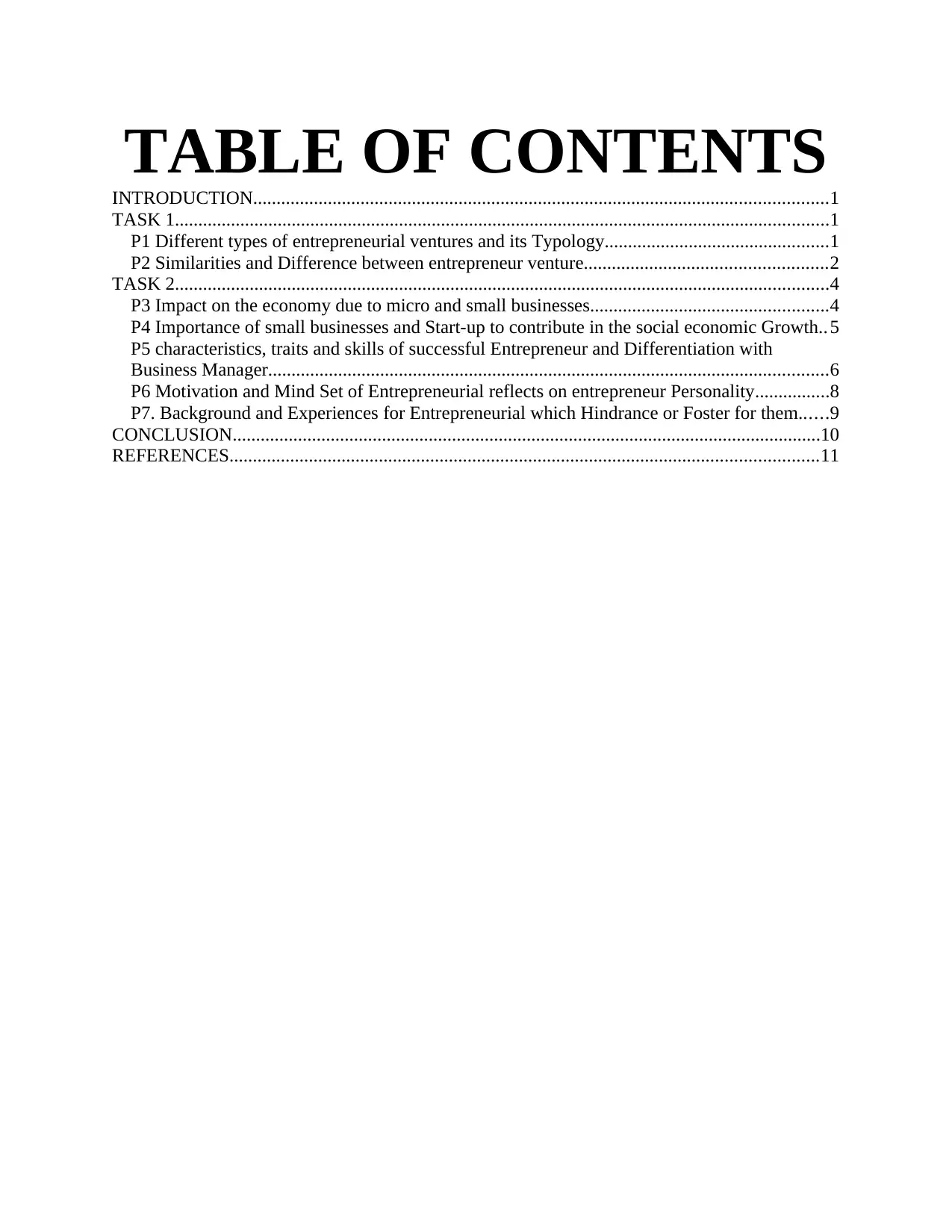
TABLE OF CONTENTSINTRODUCTION...........................................................................................................................1
TASK 1............................................................................................................................................1
P1 Different types of entrepreneurial ventures and its Typology................................................1
P2 Similarities and Difference between entrepreneur venture....................................................2
TASK 2............................................................................................................................................4
P3 Impact on the economy due to micro and small businesses...................................................4
P4 Importance of small businesses and Start-up to contribute in the social economic Growth.. 5
P5 characteristics, traits and skills of successful Entrepreneur and Differentiation with
Business Manager........................................................................................................................6
P6 Motivation and Mind Set of Entrepreneurial reflects on entrepreneur Personality................8
P7. Background and Experiences for Entrepreneurial which Hindrance or Foster for them......9
CONCLUSION..............................................................................................................................10
REFERENCES..............................................................................................................................11
TASK 1............................................................................................................................................1
P1 Different types of entrepreneurial ventures and its Typology................................................1
P2 Similarities and Difference between entrepreneur venture....................................................2
TASK 2............................................................................................................................................4
P3 Impact on the economy due to micro and small businesses...................................................4
P4 Importance of small businesses and Start-up to contribute in the social economic Growth.. 5
P5 characteristics, traits and skills of successful Entrepreneur and Differentiation with
Business Manager........................................................................................................................6
P6 Motivation and Mind Set of Entrepreneurial reflects on entrepreneur Personality................8
P7. Background and Experiences for Entrepreneurial which Hindrance or Foster for them......9
CONCLUSION..............................................................................................................................10
REFERENCES..............................................................................................................................11
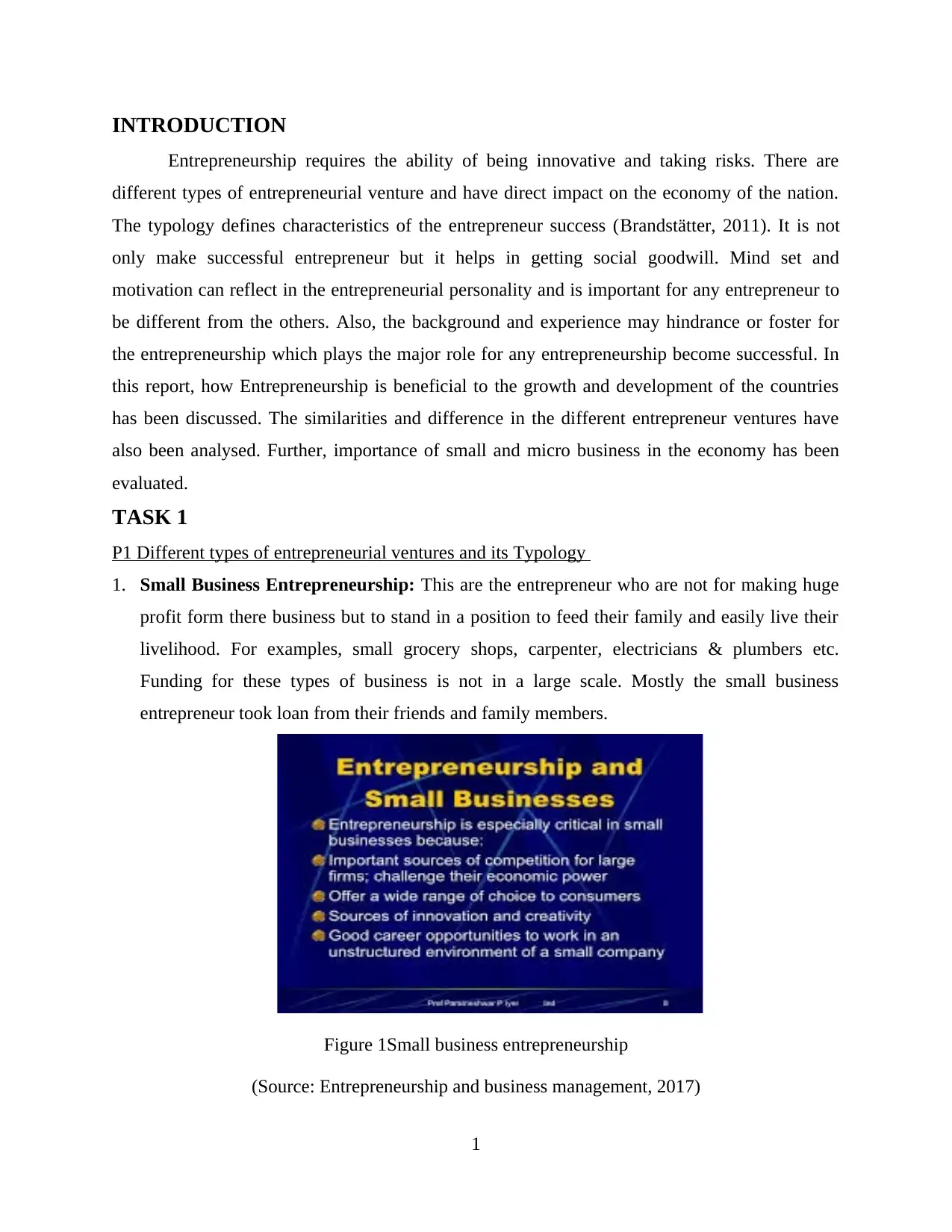
INTRODUCTION
Entrepreneurship requires the ability of being innovative and taking risks. There are
different types of entrepreneurial venture and have direct impact on the economy of the nation.
The typology defines characteristics of the entrepreneur success (Brandstätter, 2011). It is not
only make successful entrepreneur but it helps in getting social goodwill. Mind set and
motivation can reflect in the entrepreneurial personality and is important for any entrepreneur to
be different from the others. Also, the background and experience may hindrance or foster for
the entrepreneurship which plays the major role for any entrepreneurship become successful. In
this report, how Entrepreneurship is beneficial to the growth and development of the countries
has been discussed. The similarities and difference in the different entrepreneur ventures have
also been analysed. Further, importance of small and micro business in the economy has been
evaluated.
TASK 1
P1 Different types of entrepreneurial ventures and its Typology
1. Small Business Entrepreneurship: This are the entrepreneur who are not for making huge
profit form there business but to stand in a position to feed their family and easily live their
livelihood. For examples, small grocery shops, carpenter, electricians & plumbers etc.
Funding for these types of business is not in a large scale. Mostly the small business
entrepreneur took loan from their friends and family members.
Figure 1Small business entrepreneurship
(Source: Entrepreneurship and business management, 2017)
1
Entrepreneurship requires the ability of being innovative and taking risks. There are
different types of entrepreneurial venture and have direct impact on the economy of the nation.
The typology defines characteristics of the entrepreneur success (Brandstätter, 2011). It is not
only make successful entrepreneur but it helps in getting social goodwill. Mind set and
motivation can reflect in the entrepreneurial personality and is important for any entrepreneur to
be different from the others. Also, the background and experience may hindrance or foster for
the entrepreneurship which plays the major role for any entrepreneurship become successful. In
this report, how Entrepreneurship is beneficial to the growth and development of the countries
has been discussed. The similarities and difference in the different entrepreneur ventures have
also been analysed. Further, importance of small and micro business in the economy has been
evaluated.
TASK 1
P1 Different types of entrepreneurial ventures and its Typology
1. Small Business Entrepreneurship: This are the entrepreneur who are not for making huge
profit form there business but to stand in a position to feed their family and easily live their
livelihood. For examples, small grocery shops, carpenter, electricians & plumbers etc.
Funding for these types of business is not in a large scale. Mostly the small business
entrepreneur took loan from their friends and family members.
Figure 1Small business entrepreneurship
(Source: Entrepreneurship and business management, 2017)
1
⊘ This is a preview!⊘
Do you want full access?
Subscribe today to unlock all pages.

Trusted by 1+ million students worldwide
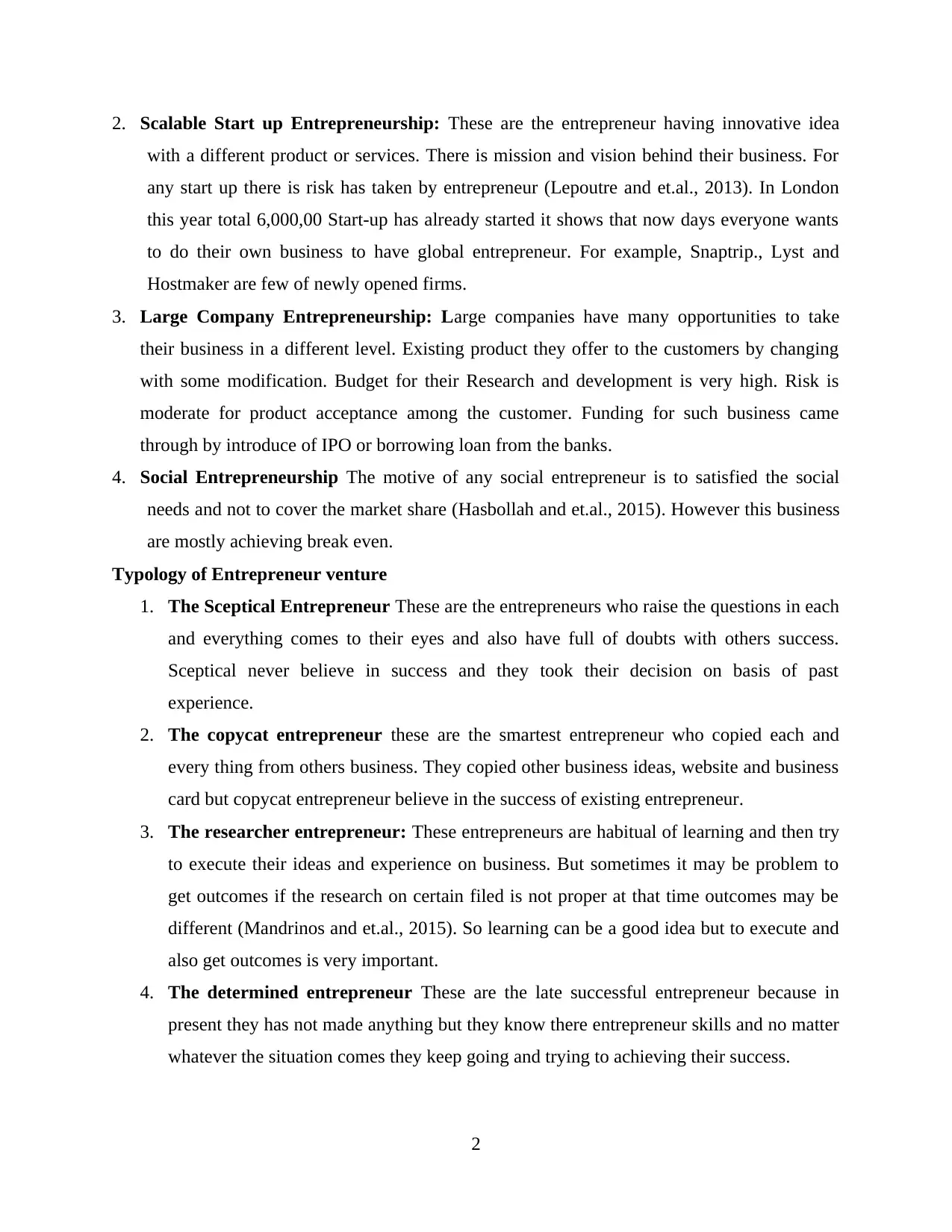
2. Scalable Start up Entrepreneurship: These are the entrepreneur having innovative idea
with a different product or services. There is mission and vision behind their business. For
any start up there is risk has taken by entrepreneur (Lepoutre and et.al., 2013). In London
this year total 6,000,00 Start-up has already started it shows that now days everyone wants
to do their own business to have global entrepreneur. For example, Snaptrip., Lyst and
Hostmaker are few of newly opened firms.
3. Large Company Entrepreneurship: Large companies have many opportunities to take
their business in a different level. Existing product they offer to the customers by changing
with some modification. Budget for their Research and development is very high. Risk is
moderate for product acceptance among the customer. Funding for such business came
through by introduce of IPO or borrowing loan from the banks.
4. Social Entrepreneurship The motive of any social entrepreneur is to satisfied the social
needs and not to cover the market share (Hasbollah and et.al., 2015). However this business
are mostly achieving break even.
Typology of Entrepreneur venture
1. The Sceptical Entrepreneur These are the entrepreneurs who raise the questions in each
and everything comes to their eyes and also have full of doubts with others success.
Sceptical never believe in success and they took their decision on basis of past
experience.
2. The copycat entrepreneur these are the smartest entrepreneur who copied each and
every thing from others business. They copied other business ideas, website and business
card but copycat entrepreneur believe in the success of existing entrepreneur.
3. The researcher entrepreneur: These entrepreneurs are habitual of learning and then try
to execute their ideas and experience on business. But sometimes it may be problem to
get outcomes if the research on certain filed is not proper at that time outcomes may be
different (Mandrinos and et.al., 2015). So learning can be a good idea but to execute and
also get outcomes is very important.
4. The determined entrepreneur These are the late successful entrepreneur because in
present they has not made anything but they know there entrepreneur skills and no matter
whatever the situation comes they keep going and trying to achieving their success.
2
with a different product or services. There is mission and vision behind their business. For
any start up there is risk has taken by entrepreneur (Lepoutre and et.al., 2013). In London
this year total 6,000,00 Start-up has already started it shows that now days everyone wants
to do their own business to have global entrepreneur. For example, Snaptrip., Lyst and
Hostmaker are few of newly opened firms.
3. Large Company Entrepreneurship: Large companies have many opportunities to take
their business in a different level. Existing product they offer to the customers by changing
with some modification. Budget for their Research and development is very high. Risk is
moderate for product acceptance among the customer. Funding for such business came
through by introduce of IPO or borrowing loan from the banks.
4. Social Entrepreneurship The motive of any social entrepreneur is to satisfied the social
needs and not to cover the market share (Hasbollah and et.al., 2015). However this business
are mostly achieving break even.
Typology of Entrepreneur venture
1. The Sceptical Entrepreneur These are the entrepreneurs who raise the questions in each
and everything comes to their eyes and also have full of doubts with others success.
Sceptical never believe in success and they took their decision on basis of past
experience.
2. The copycat entrepreneur these are the smartest entrepreneur who copied each and
every thing from others business. They copied other business ideas, website and business
card but copycat entrepreneur believe in the success of existing entrepreneur.
3. The researcher entrepreneur: These entrepreneurs are habitual of learning and then try
to execute their ideas and experience on business. But sometimes it may be problem to
get outcomes if the research on certain filed is not proper at that time outcomes may be
different (Mandrinos and et.al., 2015). So learning can be a good idea but to execute and
also get outcomes is very important.
4. The determined entrepreneur These are the late successful entrepreneur because in
present they has not made anything but they know there entrepreneur skills and no matter
whatever the situation comes they keep going and trying to achieving their success.
2
Paraphrase This Document
Need a fresh take? Get an instant paraphrase of this document with our AI Paraphraser
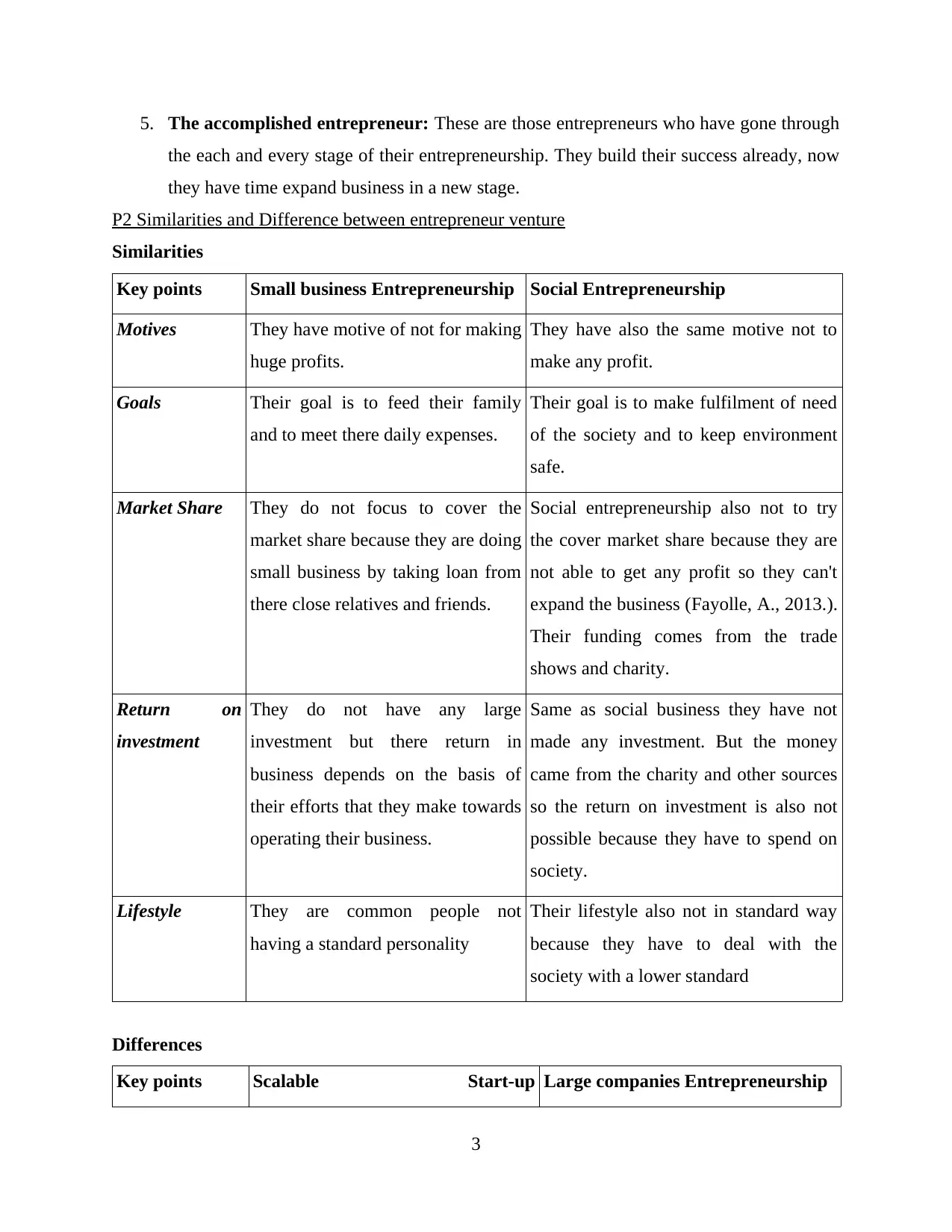
5. The accomplished entrepreneur: These are those entrepreneurs who have gone through
the each and every stage of their entrepreneurship. They build their success already, now
they have time expand business in a new stage.
P2 Similarities and Difference between entrepreneur venture
Similarities
Key points Small business Entrepreneurship Social Entrepreneurship
Motives They have motive of not for making
huge profits.
They have also the same motive not to
make any profit.
Goals Their goal is to feed their family
and to meet there daily expenses.
Their goal is to make fulfilment of need
of the society and to keep environment
safe.
Market Share They do not focus to cover the
market share because they are doing
small business by taking loan from
there close relatives and friends.
Social entrepreneurship also not to try
the cover market share because they are
not able to get any profit so they can't
expand the business (Fayolle, A., 2013.).
Their funding comes from the trade
shows and charity.
Return on
investment
They do not have any large
investment but there return in
business depends on the basis of
their efforts that they make towards
operating their business.
Same as social business they have not
made any investment. But the money
came from the charity and other sources
so the return on investment is also not
possible because they have to spend on
society.
Lifestyle They are common people not
having a standard personality
Their lifestyle also not in standard way
because they have to deal with the
society with a lower standard
Differences
Key points Scalable Start-up Large companies Entrepreneurship
3
the each and every stage of their entrepreneurship. They build their success already, now
they have time expand business in a new stage.
P2 Similarities and Difference between entrepreneur venture
Similarities
Key points Small business Entrepreneurship Social Entrepreneurship
Motives They have motive of not for making
huge profits.
They have also the same motive not to
make any profit.
Goals Their goal is to feed their family
and to meet there daily expenses.
Their goal is to make fulfilment of need
of the society and to keep environment
safe.
Market Share They do not focus to cover the
market share because they are doing
small business by taking loan from
there close relatives and friends.
Social entrepreneurship also not to try
the cover market share because they are
not able to get any profit so they can't
expand the business (Fayolle, A., 2013.).
Their funding comes from the trade
shows and charity.
Return on
investment
They do not have any large
investment but there return in
business depends on the basis of
their efforts that they make towards
operating their business.
Same as social business they have not
made any investment. But the money
came from the charity and other sources
so the return on investment is also not
possible because they have to spend on
society.
Lifestyle They are common people not
having a standard personality
Their lifestyle also not in standard way
because they have to deal with the
society with a lower standard
Differences
Key points Scalable Start-up Large companies Entrepreneurship
3
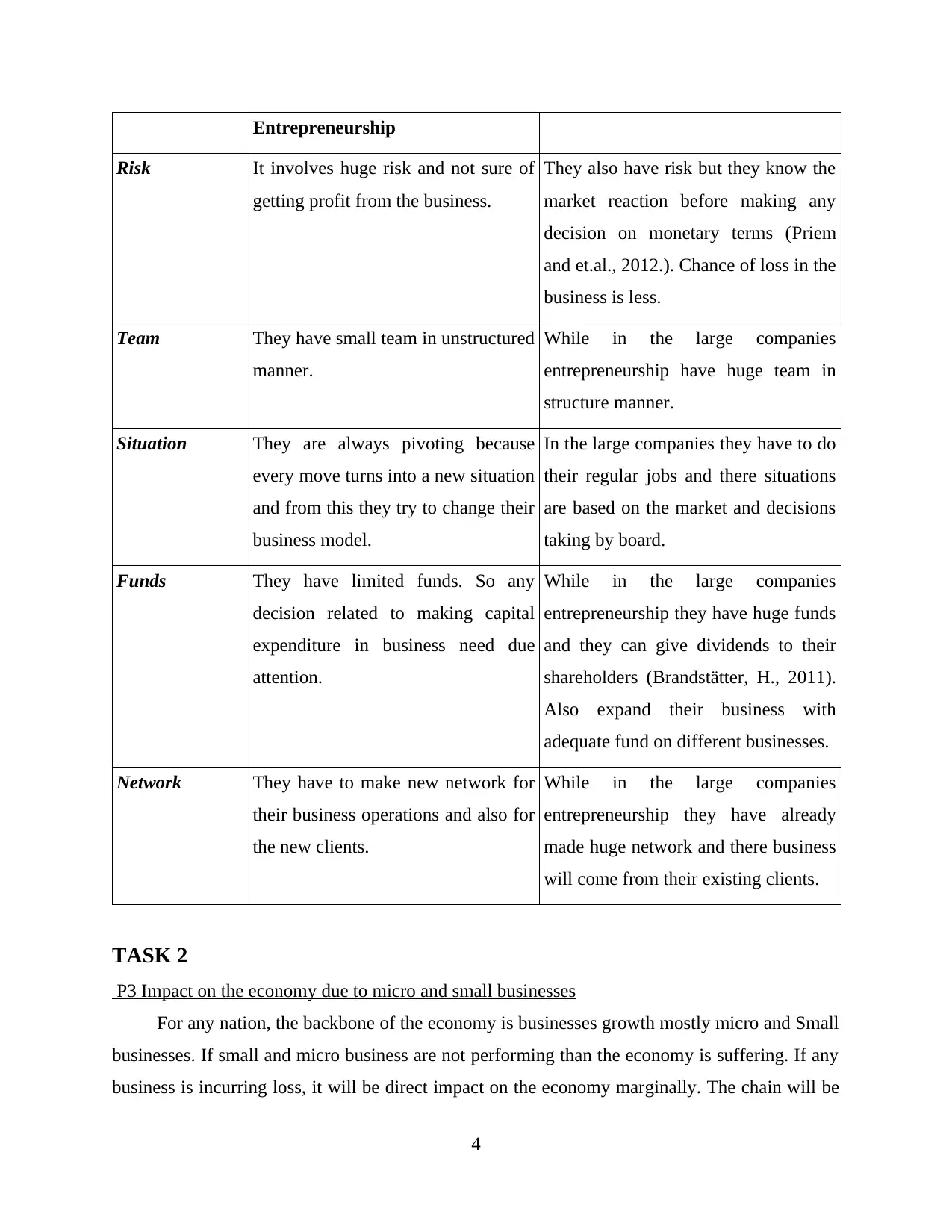
Entrepreneurship
Risk It involves huge risk and not sure of
getting profit from the business.
They also have risk but they know the
market reaction before making any
decision on monetary terms (Priem
and et.al., 2012.). Chance of loss in the
business is less.
Team They have small team in unstructured
manner.
While in the large companies
entrepreneurship have huge team in
structure manner.
Situation They are always pivoting because
every move turns into a new situation
and from this they try to change their
business model.
In the large companies they have to do
their regular jobs and there situations
are based on the market and decisions
taking by board.
Funds They have limited funds. So any
decision related to making capital
expenditure in business need due
attention.
While in the large companies
entrepreneurship they have huge funds
and they can give dividends to their
shareholders (Brandstätter, H., 2011).
Also expand their business with
adequate fund on different businesses.
Network They have to make new network for
their business operations and also for
the new clients.
While in the large companies
entrepreneurship they have already
made huge network and there business
will come from their existing clients.
TASK 2
P3 Impact on the economy due to micro and small businesses
For any nation, the backbone of the economy is businesses growth mostly micro and Small
businesses. If small and micro business are not performing than the economy is suffering. If any
business is incurring loss, it will be direct impact on the economy marginally. The chain will be
4
Risk It involves huge risk and not sure of
getting profit from the business.
They also have risk but they know the
market reaction before making any
decision on monetary terms (Priem
and et.al., 2012.). Chance of loss in the
business is less.
Team They have small team in unstructured
manner.
While in the large companies
entrepreneurship have huge team in
structure manner.
Situation They are always pivoting because
every move turns into a new situation
and from this they try to change their
business model.
In the large companies they have to do
their regular jobs and there situations
are based on the market and decisions
taking by board.
Funds They have limited funds. So any
decision related to making capital
expenditure in business need due
attention.
While in the large companies
entrepreneurship they have huge funds
and they can give dividends to their
shareholders (Brandstätter, H., 2011).
Also expand their business with
adequate fund on different businesses.
Network They have to make new network for
their business operations and also for
the new clients.
While in the large companies
entrepreneurship they have already
made huge network and there business
will come from their existing clients.
TASK 2
P3 Impact on the economy due to micro and small businesses
For any nation, the backbone of the economy is businesses growth mostly micro and Small
businesses. If small and micro business are not performing than the economy is suffering. If any
business is incurring loss, it will be direct impact on the economy marginally. The chain will be
4
⊘ This is a preview!⊘
Do you want full access?
Subscribe today to unlock all pages.

Trusted by 1+ million students worldwide
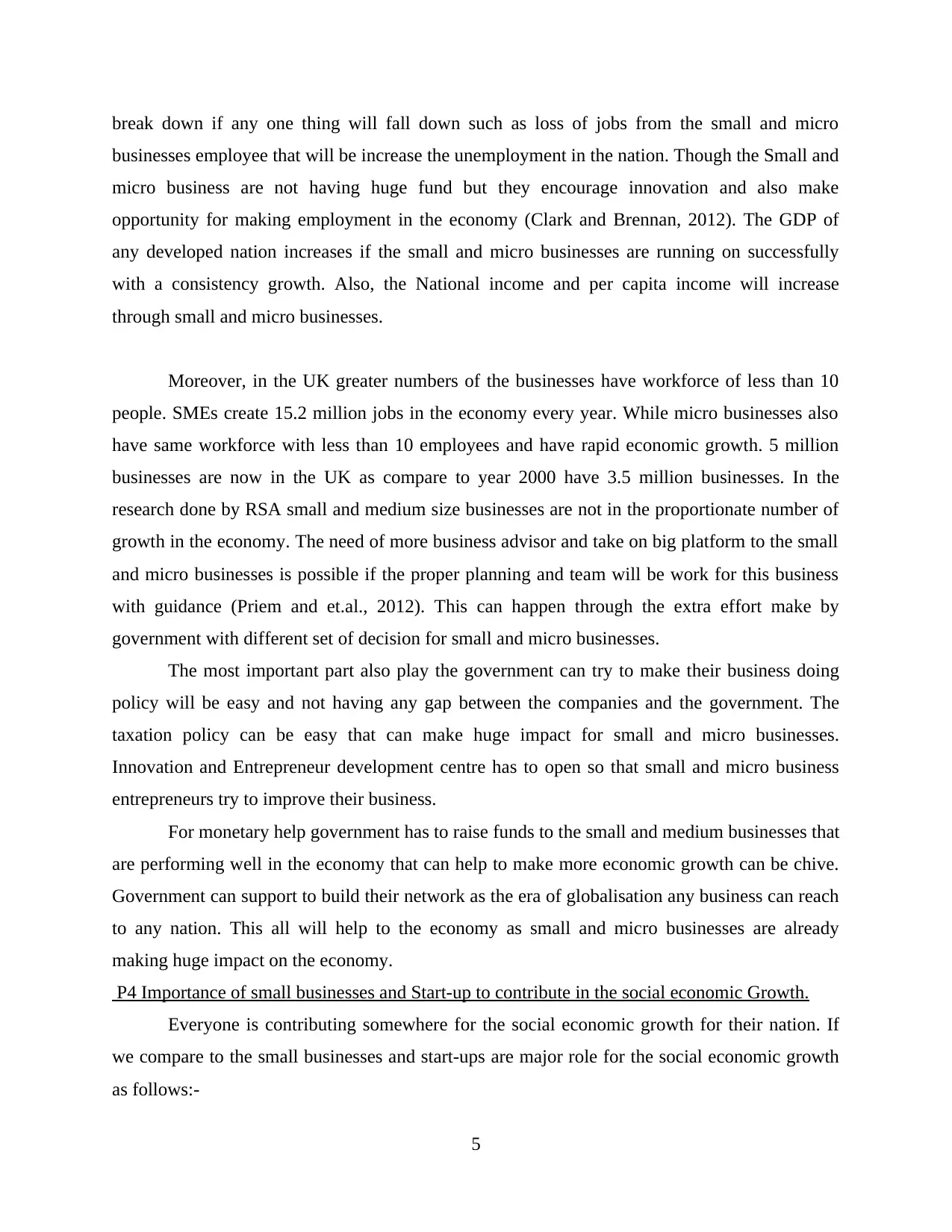
break down if any one thing will fall down such as loss of jobs from the small and micro
businesses employee that will be increase the unemployment in the nation. Though the Small and
micro business are not having huge fund but they encourage innovation and also make
opportunity for making employment in the economy (Clark and Brennan, 2012). The GDP of
any developed nation increases if the small and micro businesses are running on successfully
with a consistency growth. Also, the National income and per capita income will increase
through small and micro businesses.
Moreover, in the UK greater numbers of the businesses have workforce of less than 10
people. SMEs create 15.2 million jobs in the economy every year. While micro businesses also
have same workforce with less than 10 employees and have rapid economic growth. 5 million
businesses are now in the UK as compare to year 2000 have 3.5 million businesses. In the
research done by RSA small and medium size businesses are not in the proportionate number of
growth in the economy. The need of more business advisor and take on big platform to the small
and micro businesses is possible if the proper planning and team will be work for this business
with guidance (Priem and et.al., 2012). This can happen through the extra effort make by
government with different set of decision for small and micro businesses.
The most important part also play the government can try to make their business doing
policy will be easy and not having any gap between the companies and the government. The
taxation policy can be easy that can make huge impact for small and micro businesses.
Innovation and Entrepreneur development centre has to open so that small and micro business
entrepreneurs try to improve their business.
For monetary help government has to raise funds to the small and medium businesses that
are performing well in the economy that can help to make more economic growth can be chive.
Government can support to build their network as the era of globalisation any business can reach
to any nation. This all will help to the economy as small and micro businesses are already
making huge impact on the economy.
P4 Importance of small businesses and Start-up to contribute in the social economic Growth.
Everyone is contributing somewhere for the social economic growth for their nation. If
we compare to the small businesses and start-ups are major role for the social economic growth
as follows:-
5
businesses employee that will be increase the unemployment in the nation. Though the Small and
micro business are not having huge fund but they encourage innovation and also make
opportunity for making employment in the economy (Clark and Brennan, 2012). The GDP of
any developed nation increases if the small and micro businesses are running on successfully
with a consistency growth. Also, the National income and per capita income will increase
through small and micro businesses.
Moreover, in the UK greater numbers of the businesses have workforce of less than 10
people. SMEs create 15.2 million jobs in the economy every year. While micro businesses also
have same workforce with less than 10 employees and have rapid economic growth. 5 million
businesses are now in the UK as compare to year 2000 have 3.5 million businesses. In the
research done by RSA small and medium size businesses are not in the proportionate number of
growth in the economy. The need of more business advisor and take on big platform to the small
and micro businesses is possible if the proper planning and team will be work for this business
with guidance (Priem and et.al., 2012). This can happen through the extra effort make by
government with different set of decision for small and micro businesses.
The most important part also play the government can try to make their business doing
policy will be easy and not having any gap between the companies and the government. The
taxation policy can be easy that can make huge impact for small and micro businesses.
Innovation and Entrepreneur development centre has to open so that small and micro business
entrepreneurs try to improve their business.
For monetary help government has to raise funds to the small and medium businesses that
are performing well in the economy that can help to make more economic growth can be chive.
Government can support to build their network as the era of globalisation any business can reach
to any nation. This all will help to the economy as small and micro businesses are already
making huge impact on the economy.
P4 Importance of small businesses and Start-up to contribute in the social economic Growth.
Everyone is contributing somewhere for the social economic growth for their nation. If
we compare to the small businesses and start-ups are major role for the social economic growth
as follows:-
5
Paraphrase This Document
Need a fresh take? Get an instant paraphrase of this document with our AI Paraphraser
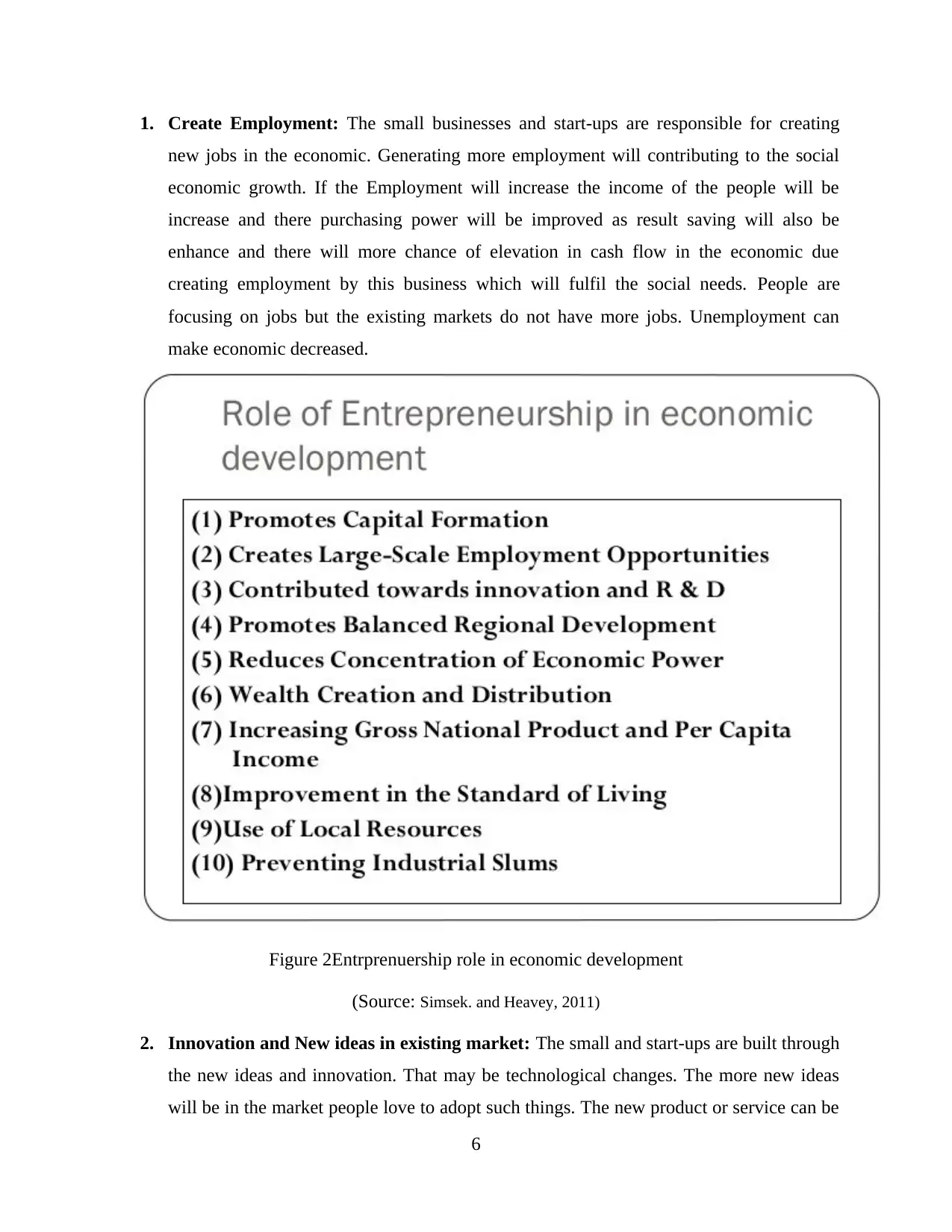
1. Create Employment: The small businesses and start-ups are responsible for creating
new jobs in the economic. Generating more employment will contributing to the social
economic growth. If the Employment will increase the income of the people will be
increase and there purchasing power will be improved as result saving will also be
enhance and there will more chance of elevation in cash flow in the economic due
creating employment by this business which will fulfil the social needs. People are
focusing on jobs but the existing markets do not have more jobs. Unemployment can
make economic decreased.
Figure 2Entrprenuership role in economic development
(Source: Simsek. and Heavey, 2011)
2. Innovation and New ideas in existing market: The small and start-ups are built through
the new ideas and innovation. That may be technological changes. The more new ideas
will be in the market people love to adopt such things. The new product or service can be
6
new jobs in the economic. Generating more employment will contributing to the social
economic growth. If the Employment will increase the income of the people will be
increase and there purchasing power will be improved as result saving will also be
enhance and there will more chance of elevation in cash flow in the economic due
creating employment by this business which will fulfil the social needs. People are
focusing on jobs but the existing markets do not have more jobs. Unemployment can
make economic decreased.
Figure 2Entrprenuership role in economic development
(Source: Simsek. and Heavey, 2011)
2. Innovation and New ideas in existing market: The small and start-ups are built through
the new ideas and innovation. That may be technological changes. The more new ideas
will be in the market people love to adopt such things. The new product or service can be
6
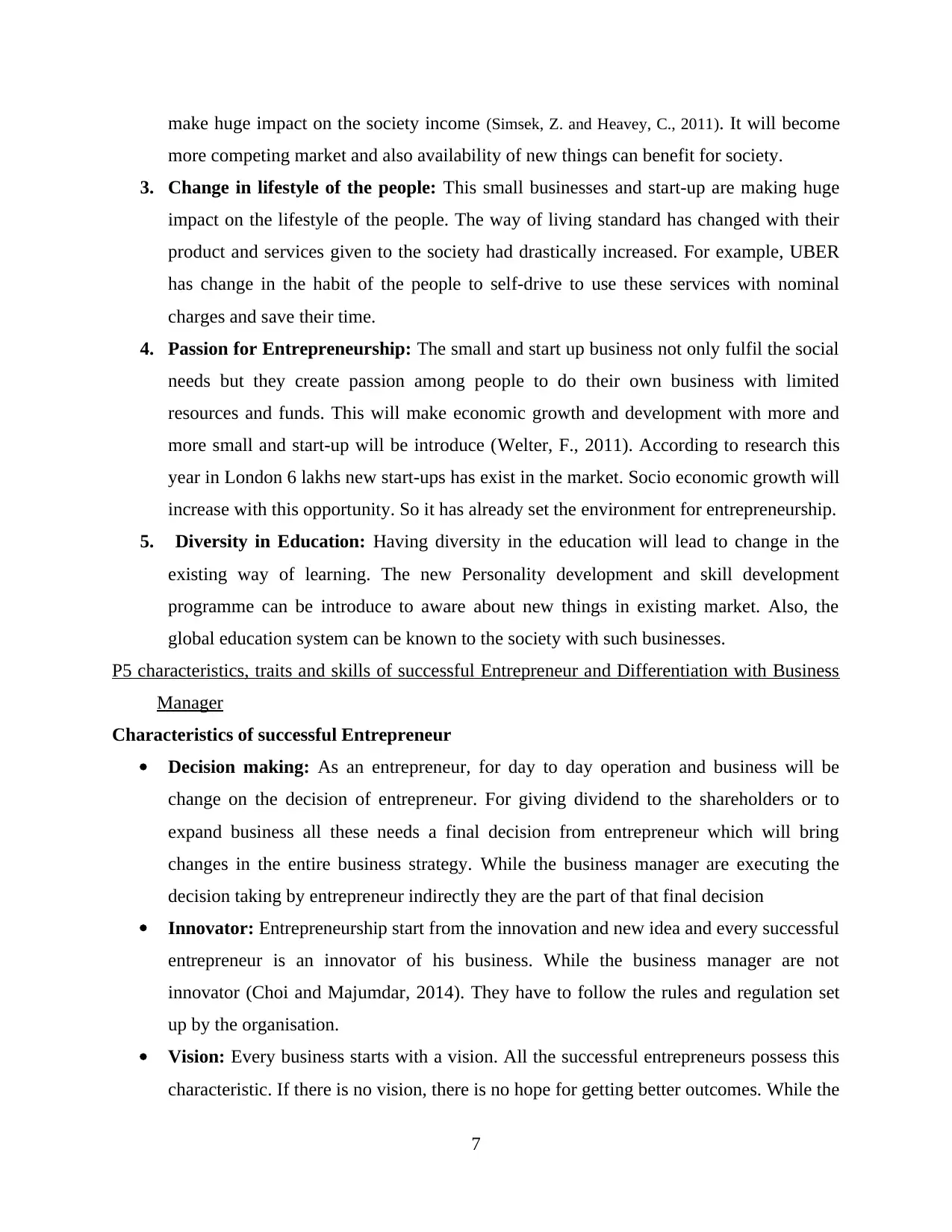
make huge impact on the society income (Simsek, Z. and Heavey, C., 2011). It will become
more competing market and also availability of new things can benefit for society.
3. Change in lifestyle of the people: This small businesses and start-up are making huge
impact on the lifestyle of the people. The way of living standard has changed with their
product and services given to the society had drastically increased. For example, UBER
has change in the habit of the people to self-drive to use these services with nominal
charges and save their time.
4. Passion for Entrepreneurship: The small and start up business not only fulfil the social
needs but they create passion among people to do their own business with limited
resources and funds. This will make economic growth and development with more and
more small and start-up will be introduce (Welter, F., 2011). According to research this
year in London 6 lakhs new start-ups has exist in the market. Socio economic growth will
increase with this opportunity. So it has already set the environment for entrepreneurship.
5. Diversity in Education: Having diversity in the education will lead to change in the
existing way of learning. The new Personality development and skill development
programme can be introduce to aware about new things in existing market. Also, the
global education system can be known to the society with such businesses.
P5 characteristics, traits and skills of successful Entrepreneur and Differentiation with Business
Manager
Characteristics of successful Entrepreneur
Decision making: As an entrepreneur, for day to day operation and business will be
change on the decision of entrepreneur. For giving dividend to the shareholders or to
expand business all these needs a final decision from entrepreneur which will bring
changes in the entire business strategy. While the business manager are executing the
decision taking by entrepreneur indirectly they are the part of that final decision
Innovator: Entrepreneurship start from the innovation and new idea and every successful
entrepreneur is an innovator of his business. While the business manager are not
innovator (Choi and Majumdar, 2014). They have to follow the rules and regulation set
up by the organisation.
Vision: Every business starts with a vision. All the successful entrepreneurs possess this
characteristic. If there is no vision, there is no hope for getting better outcomes. While the
7
more competing market and also availability of new things can benefit for society.
3. Change in lifestyle of the people: This small businesses and start-up are making huge
impact on the lifestyle of the people. The way of living standard has changed with their
product and services given to the society had drastically increased. For example, UBER
has change in the habit of the people to self-drive to use these services with nominal
charges and save their time.
4. Passion for Entrepreneurship: The small and start up business not only fulfil the social
needs but they create passion among people to do their own business with limited
resources and funds. This will make economic growth and development with more and
more small and start-up will be introduce (Welter, F., 2011). According to research this
year in London 6 lakhs new start-ups has exist in the market. Socio economic growth will
increase with this opportunity. So it has already set the environment for entrepreneurship.
5. Diversity in Education: Having diversity in the education will lead to change in the
existing way of learning. The new Personality development and skill development
programme can be introduce to aware about new things in existing market. Also, the
global education system can be known to the society with such businesses.
P5 characteristics, traits and skills of successful Entrepreneur and Differentiation with Business
Manager
Characteristics of successful Entrepreneur
Decision making: As an entrepreneur, for day to day operation and business will be
change on the decision of entrepreneur. For giving dividend to the shareholders or to
expand business all these needs a final decision from entrepreneur which will bring
changes in the entire business strategy. While the business manager are executing the
decision taking by entrepreneur indirectly they are the part of that final decision
Innovator: Entrepreneurship start from the innovation and new idea and every successful
entrepreneur is an innovator of his business. While the business manager are not
innovator (Choi and Majumdar, 2014). They have to follow the rules and regulation set
up by the organisation.
Vision: Every business starts with a vision. All the successful entrepreneurs possess this
characteristic. If there is no vision, there is no hope for getting better outcomes. While the
7
⊘ This is a preview!⊘
Do you want full access?
Subscribe today to unlock all pages.

Trusted by 1+ million students worldwide
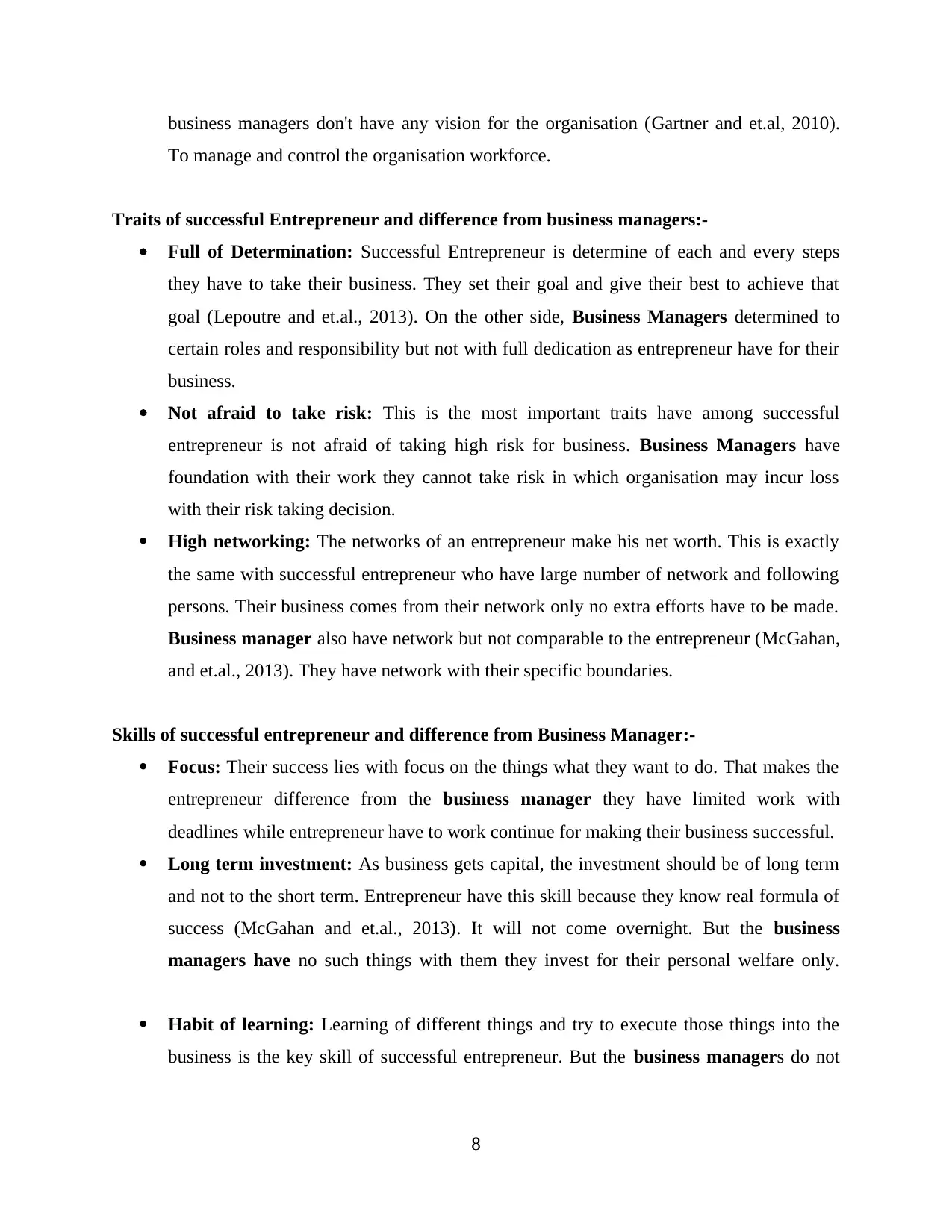
business managers don't have any vision for the organisation (Gartner and et.al, 2010).
To manage and control the organisation workforce.
Traits of successful Entrepreneur and difference from business managers:-
Full of Determination: Successful Entrepreneur is determine of each and every steps
they have to take their business. They set their goal and give their best to achieve that
goal (Lepoutre and et.al., 2013). On the other side, Business Managers determined to
certain roles and responsibility but not with full dedication as entrepreneur have for their
business.
Not afraid to take risk: This is the most important traits have among successful
entrepreneur is not afraid of taking high risk for business. Business Managers have
foundation with their work they cannot take risk in which organisation may incur loss
with their risk taking decision.
High networking: The networks of an entrepreneur make his net worth. This is exactly
the same with successful entrepreneur who have large number of network and following
persons. Their business comes from their network only no extra efforts have to be made.
Business manager also have network but not comparable to the entrepreneur (McGahan,
and et.al., 2013). They have network with their specific boundaries.
Skills of successful entrepreneur and difference from Business Manager:-
Focus: Their success lies with focus on the things what they want to do. That makes the
entrepreneur difference from the business manager they have limited work with
deadlines while entrepreneur have to work continue for making their business successful.
Long term investment: As business gets capital, the investment should be of long term
and not to the short term. Entrepreneur have this skill because they know real formula of
success (McGahan and et.al., 2013). It will not come overnight. But the business
managers have no such things with them they invest for their personal welfare only.
Habit of learning: Learning of different things and try to execute those things into the
business is the key skill of successful entrepreneur. But the business managers do not
8
To manage and control the organisation workforce.
Traits of successful Entrepreneur and difference from business managers:-
Full of Determination: Successful Entrepreneur is determine of each and every steps
they have to take their business. They set their goal and give their best to achieve that
goal (Lepoutre and et.al., 2013). On the other side, Business Managers determined to
certain roles and responsibility but not with full dedication as entrepreneur have for their
business.
Not afraid to take risk: This is the most important traits have among successful
entrepreneur is not afraid of taking high risk for business. Business Managers have
foundation with their work they cannot take risk in which organisation may incur loss
with their risk taking decision.
High networking: The networks of an entrepreneur make his net worth. This is exactly
the same with successful entrepreneur who have large number of network and following
persons. Their business comes from their network only no extra efforts have to be made.
Business manager also have network but not comparable to the entrepreneur (McGahan,
and et.al., 2013). They have network with their specific boundaries.
Skills of successful entrepreneur and difference from Business Manager:-
Focus: Their success lies with focus on the things what they want to do. That makes the
entrepreneur difference from the business manager they have limited work with
deadlines while entrepreneur have to work continue for making their business successful.
Long term investment: As business gets capital, the investment should be of long term
and not to the short term. Entrepreneur have this skill because they know real formula of
success (McGahan and et.al., 2013). It will not come overnight. But the business
managers have no such things with them they invest for their personal welfare only.
Habit of learning: Learning of different things and try to execute those things into the
business is the key skill of successful entrepreneur. But the business managers do not
8
Paraphrase This Document
Need a fresh take? Get an instant paraphrase of this document with our AI Paraphraser
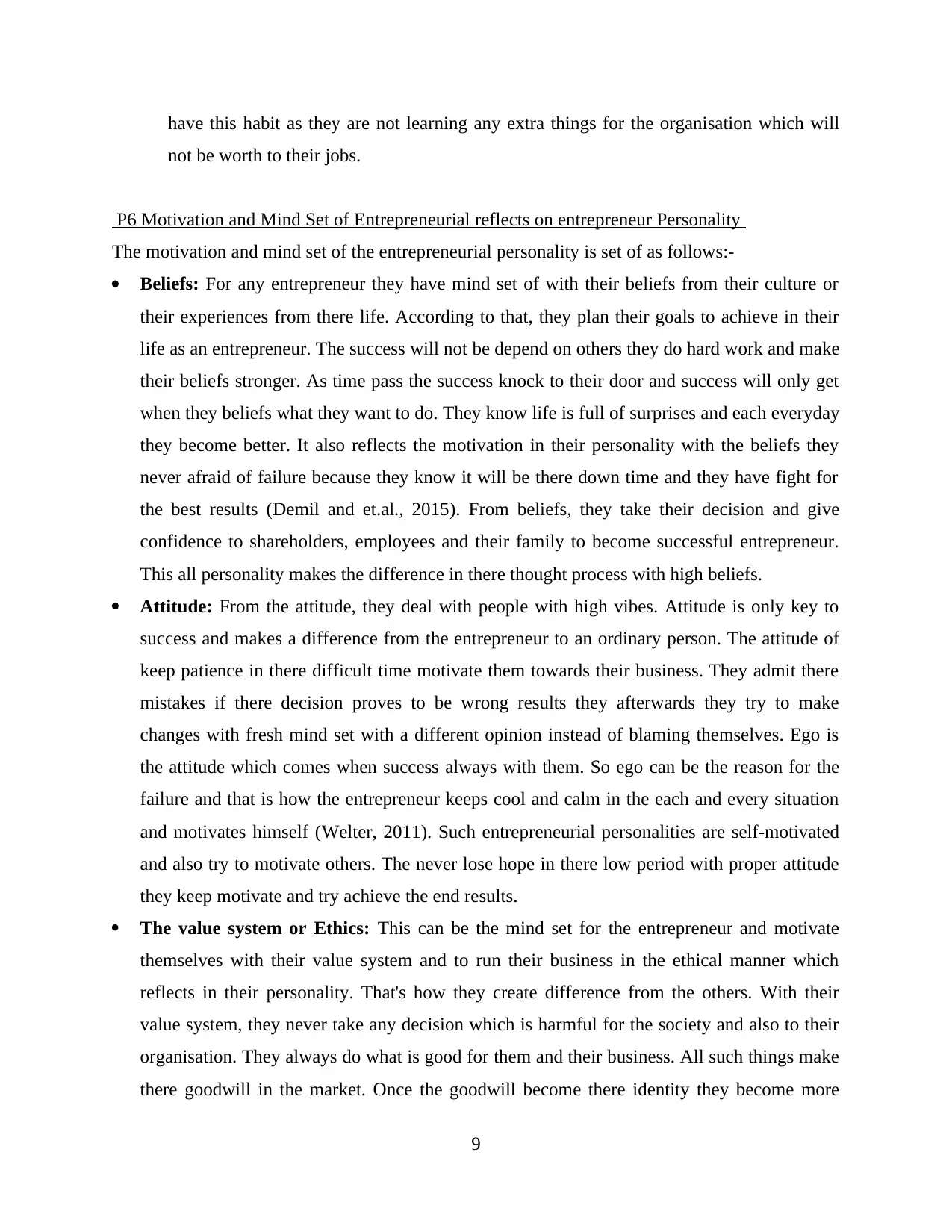
have this habit as they are not learning any extra things for the organisation which will
not be worth to their jobs.
P6 Motivation and Mind Set of Entrepreneurial reflects on entrepreneur Personality
The motivation and mind set of the entrepreneurial personality is set of as follows:-
Beliefs: For any entrepreneur they have mind set of with their beliefs from their culture or
their experiences from there life. According to that, they plan their goals to achieve in their
life as an entrepreneur. The success will not be depend on others they do hard work and make
their beliefs stronger. As time pass the success knock to their door and success will only get
when they beliefs what they want to do. They know life is full of surprises and each everyday
they become better. It also reflects the motivation in their personality with the beliefs they
never afraid of failure because they know it will be there down time and they have fight for
the best results (Demil and et.al., 2015). From beliefs, they take their decision and give
confidence to shareholders, employees and their family to become successful entrepreneur.
This all personality makes the difference in there thought process with high beliefs.
Attitude: From the attitude, they deal with people with high vibes. Attitude is only key to
success and makes a difference from the entrepreneur to an ordinary person. The attitude of
keep patience in there difficult time motivate them towards their business. They admit there
mistakes if there decision proves to be wrong results they afterwards they try to make
changes with fresh mind set with a different opinion instead of blaming themselves. Ego is
the attitude which comes when success always with them. So ego can be the reason for the
failure and that is how the entrepreneur keeps cool and calm in the each and every situation
and motivates himself (Welter, 2011). Such entrepreneurial personalities are self-motivated
and also try to motivate others. The never lose hope in there low period with proper attitude
they keep motivate and try achieve the end results.
The value system or Ethics: This can be the mind set for the entrepreneur and motivate
themselves with their value system and to run their business in the ethical manner which
reflects in their personality. That's how they create difference from the others. With their
value system, they never take any decision which is harmful for the society and also to their
organisation. They always do what is good for them and their business. All such things make
there goodwill in the market. Once the goodwill become there identity they become more
9
not be worth to their jobs.
P6 Motivation and Mind Set of Entrepreneurial reflects on entrepreneur Personality
The motivation and mind set of the entrepreneurial personality is set of as follows:-
Beliefs: For any entrepreneur they have mind set of with their beliefs from their culture or
their experiences from there life. According to that, they plan their goals to achieve in their
life as an entrepreneur. The success will not be depend on others they do hard work and make
their beliefs stronger. As time pass the success knock to their door and success will only get
when they beliefs what they want to do. They know life is full of surprises and each everyday
they become better. It also reflects the motivation in their personality with the beliefs they
never afraid of failure because they know it will be there down time and they have fight for
the best results (Demil and et.al., 2015). From beliefs, they take their decision and give
confidence to shareholders, employees and their family to become successful entrepreneur.
This all personality makes the difference in there thought process with high beliefs.
Attitude: From the attitude, they deal with people with high vibes. Attitude is only key to
success and makes a difference from the entrepreneur to an ordinary person. The attitude of
keep patience in there difficult time motivate them towards their business. They admit there
mistakes if there decision proves to be wrong results they afterwards they try to make
changes with fresh mind set with a different opinion instead of blaming themselves. Ego is
the attitude which comes when success always with them. So ego can be the reason for the
failure and that is how the entrepreneur keeps cool and calm in the each and every situation
and motivates himself (Welter, 2011). Such entrepreneurial personalities are self-motivated
and also try to motivate others. The never lose hope in there low period with proper attitude
they keep motivate and try achieve the end results.
The value system or Ethics: This can be the mind set for the entrepreneur and motivate
themselves with their value system and to run their business in the ethical manner which
reflects in their personality. That's how they create difference from the others. With their
value system, they never take any decision which is harmful for the society and also to their
organisation. They always do what is good for them and their business. All such things make
there goodwill in the market. Once the goodwill become there identity they become more
9
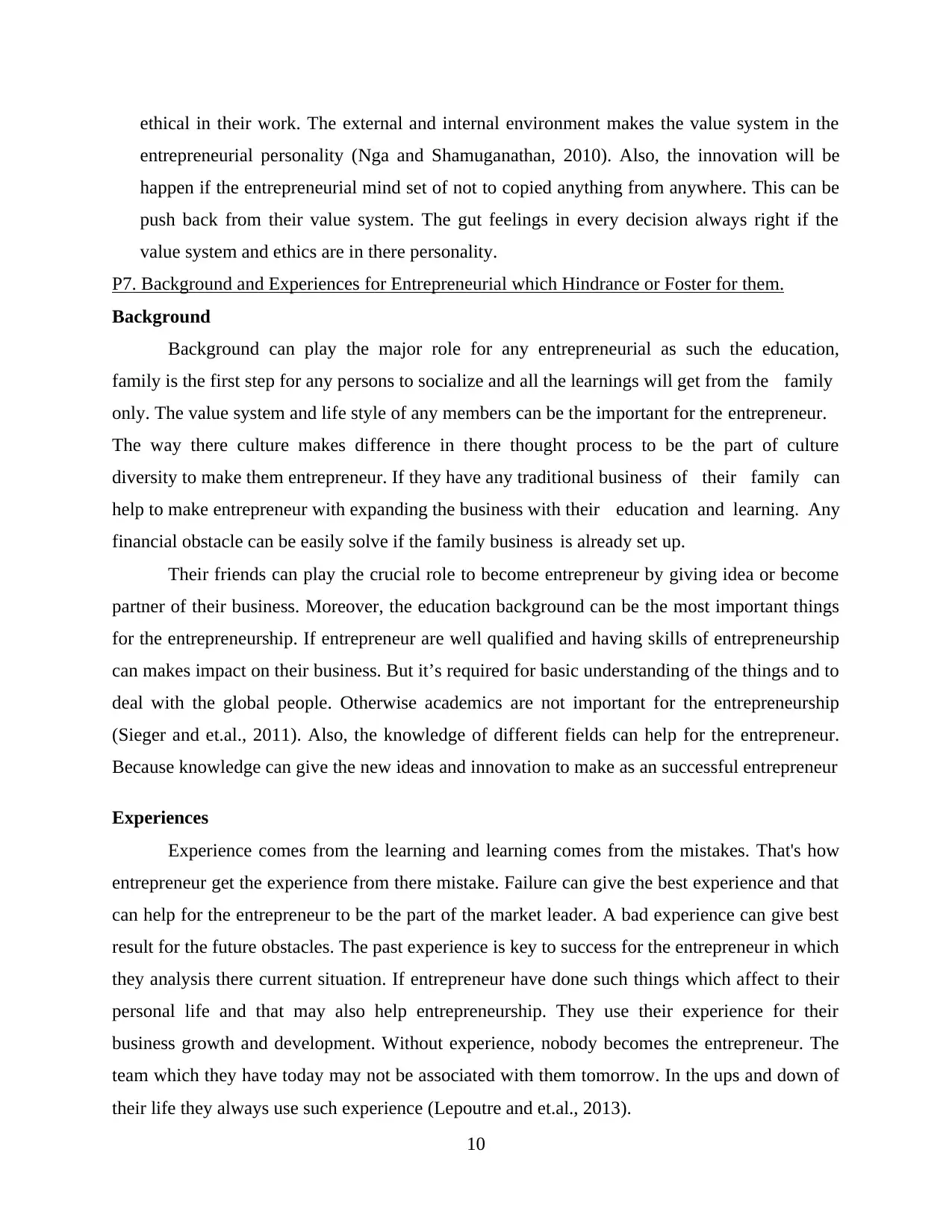
ethical in their work. The external and internal environment makes the value system in the
entrepreneurial personality (Nga and Shamuganathan, 2010). Also, the innovation will be
happen if the entrepreneurial mind set of not to copied anything from anywhere. This can be
push back from their value system. The gut feelings in every decision always right if the
value system and ethics are in there personality.
P7. Background and Experiences for Entrepreneurial which Hindrance or Foster for them.
Background
Background can play the major role for any entrepreneurial as such the education,
family is the first step for any persons to socialize and all the learnings will get from the family
only. The value system and life style of any members can be the important for the entrepreneur.
The way there culture makes difference in there thought process to be the part of culture
diversity to make them entrepreneur. If they have any traditional business of their family can
help to make entrepreneur with expanding the business with their education and learning. Any
financial obstacle can be easily solve if the family business is already set up.
Their friends can play the crucial role to become entrepreneur by giving idea or become
partner of their business. Moreover, the education background can be the most important things
for the entrepreneurship. If entrepreneur are well qualified and having skills of entrepreneurship
can makes impact on their business. But it’s required for basic understanding of the things and to
deal with the global people. Otherwise academics are not important for the entrepreneurship
(Sieger and et.al., 2011). Also, the knowledge of different fields can help for the entrepreneur.
Because knowledge can give the new ideas and innovation to make as an successful entrepreneur
Experiences
Experience comes from the learning and learning comes from the mistakes. That's how
entrepreneur get the experience from there mistake. Failure can give the best experience and that
can help for the entrepreneur to be the part of the market leader. A bad experience can give best
result for the future obstacles. The past experience is key to success for the entrepreneur in which
they analysis there current situation. If entrepreneur have done such things which affect to their
personal life and that may also help entrepreneurship. They use their experience for their
business growth and development. Without experience, nobody becomes the entrepreneur. The
team which they have today may not be associated with them tomorrow. In the ups and down of
their life they always use such experience (Lepoutre and et.al., 2013).
10
entrepreneurial personality (Nga and Shamuganathan, 2010). Also, the innovation will be
happen if the entrepreneurial mind set of not to copied anything from anywhere. This can be
push back from their value system. The gut feelings in every decision always right if the
value system and ethics are in there personality.
P7. Background and Experiences for Entrepreneurial which Hindrance or Foster for them.
Background
Background can play the major role for any entrepreneurial as such the education,
family is the first step for any persons to socialize and all the learnings will get from the family
only. The value system and life style of any members can be the important for the entrepreneur.
The way there culture makes difference in there thought process to be the part of culture
diversity to make them entrepreneur. If they have any traditional business of their family can
help to make entrepreneur with expanding the business with their education and learning. Any
financial obstacle can be easily solve if the family business is already set up.
Their friends can play the crucial role to become entrepreneur by giving idea or become
partner of their business. Moreover, the education background can be the most important things
for the entrepreneurship. If entrepreneur are well qualified and having skills of entrepreneurship
can makes impact on their business. But it’s required for basic understanding of the things and to
deal with the global people. Otherwise academics are not important for the entrepreneurship
(Sieger and et.al., 2011). Also, the knowledge of different fields can help for the entrepreneur.
Because knowledge can give the new ideas and innovation to make as an successful entrepreneur
Experiences
Experience comes from the learning and learning comes from the mistakes. That's how
entrepreneur get the experience from there mistake. Failure can give the best experience and that
can help for the entrepreneur to be the part of the market leader. A bad experience can give best
result for the future obstacles. The past experience is key to success for the entrepreneur in which
they analysis there current situation. If entrepreneur have done such things which affect to their
personal life and that may also help entrepreneurship. They use their experience for their
business growth and development. Without experience, nobody becomes the entrepreneur. The
team which they have today may not be associated with them tomorrow. In the ups and down of
their life they always use such experience (Lepoutre and et.al., 2013).
10
⊘ This is a preview!⊘
Do you want full access?
Subscribe today to unlock all pages.

Trusted by 1+ million students worldwide
1 out of 15
Related Documents
Your All-in-One AI-Powered Toolkit for Academic Success.
+13062052269
info@desklib.com
Available 24*7 on WhatsApp / Email
![[object Object]](/_next/static/media/star-bottom.7253800d.svg)
Unlock your academic potential
Copyright © 2020–2025 A2Z Services. All Rights Reserved. Developed and managed by ZUCOL.





